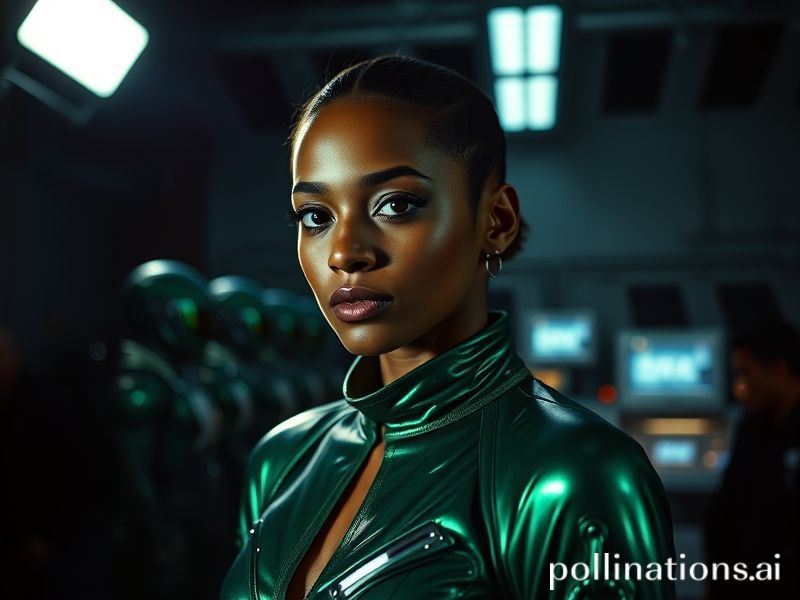Blue, Green, and Gold: How Zoe Saldaña Became the Planet’s Most Bankable Alien
Zoe Saldaña: Hollywood’s Favorite Alien, Globalism’s Accidental Poster Girl
PARIS—Somewhere between the popcorn-scented multiplexes of suburban Ohio and the neon-drenched midnight shows of Seoul, Zoe Saldaña has quietly become the most profitable non-terrestrial in cinematic history. Her cumulative box-office take—north of $14 billion—doesn’t just dwarf the GDP of several island nations; it also proves, in a roundabout way, that Earthlings will pay good money to watch a woman who rarely looks like herself. Blue cat-person, green assassin, indomitable space marine: Saldaña has spent so much time in CGI cosplay that immigration officers probably ask her which planet she’s arriving from.
Yet the joke’s on us: while the rest of the planet argues about borders, tariffs, and whose culture is being appropriated by whom, Saldaña has been selling the same passport-stamped fantasy to everyone. Avatar’s Pandora and Guardians’ galaxy far, far away aren’t just escapism; they’re the ultimate free-trade zones, where American studio money hires British effects houses to animate a Dominican-Puerto Rican actress so that Chinese teenagers can dream in IMAX. If that isn’t globalization wearing 3-D glasses, what is?
Of course, international stardom is rarely a meritocracy; it’s more like a very expensive potluck where the host insists you bring a dish that pleases every palate without offending any. Saldaña’s trick is to show up with a CGI casserole seasoned just enough Dominican sazón to satisfy the Latin American market, a dash of Stateside swagger for the U.S. crowd, and a polite nod to European auteur theory whenever she works with the odd French director between tentpoles. The result? A multicultural product that markets itself: she’s simultaneously “one of us” in Santo Domingo, a “Latina who made it” in Los Angeles, and an aspirational blank slate everywhere else.
Naturally, the darker corners of the internet have opinions. Critics in Madrid accuse her of “not sounding Dominican enough,” while commentators in Lagos roll their eyes at another brown-skinned hero who still needs Hollywood’s digital paint job to be bankable. Meanwhile, the accountants at Disney simply smile, convert yuan to dollars, and green-light another trilogy. Everyone gets what they want, even if nobody’s entirely happy—a diplomatic triumph worthy of the UN, only with better explosions.
Off-screen, Saldaña’s life reads like a satire of modern mobility. She bounces between estates in Los Angeles, a tax-friendly hideout in Malibu, and film sets in New Zealand, speaking Spanish to her kids, English to her agents, and fluent Franchise to whatever producer waves a royalty statement. Her marriage to Italian artist Marco Perego—who, in a plot twist that would make a screenwriter blush, took her surname—has turned the couple into walking think-pieces about gender norms, hyphenated identities, and the sheer absurdity of Italian passport control trying to spell “Saldana-Gallo-Perego” on a tiny blue stamp.
Still, the real punchline is geopolitical. In an era when nations weaponize streaming algorithms and presidents tweet foreign policy, Saldaña’s face—digitally recolored, culturally decentered, and linguistically polyglot—has become a soft-power export more effective than any embassy cocktail party. The State Department can’t beam American values into Tehran, but a bootleg Guardians of the Galaxy torrent dubbed in Farsi? That slips past the censors every time.
So here we are, orbiting a planet on fire, where supply chains snap, democracies wobble, and the price of bread is anyone’s guess—yet a 45-year-old mother of three can still convince us to root for talking raccoons and fragile ecosystems by painting herself green and pretending gravity is negotiable. If that’s not a metaphor for the human condition in 2024, I don’t know what is.
As the credits roll on another record-breaking weekend, remember this: while governments argue over who belongs where, Zoe Saldaña keeps cashing checks for pretending to be everything except what she actually is—one of us, stuck on the same doomed rock, praying the sequel rights don’t expire before we do.







